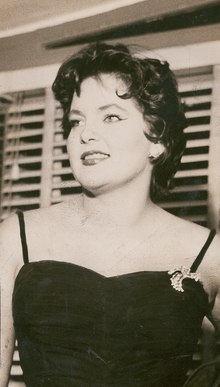| This article needs additional citations for verification. Please help improve this article by adding citations to reliable sources. Unsourced material may be challenged and removed. Find sources: "Maysa Matarazzo" – news · newspapers · books · scholar · JSTOR (January 2013) (Learn how and when to remove this message) |
| Maysa Matarazzo | |
|---|---|
 Matarazzo in 1958 Matarazzo in 1958 | |
| Born | Maysa Figueira Monjardim (1936-06-06)June 6, 1936 Rio de Janeiro, Brazil |
| Died | January 22, 1977(1977-01-22) (aged 40) Rio–Niterói Bridge, Rio de Janeiro, Brazil |
| Occupation | Singer |
| Years active | 1956–1977 |
| Spouse |
André Matarazzo
(m. 1954; sep. 1957) |
| Children | Jayme Monjardim |
Maysa Figueira Monjardim (June 6, 1936 – January 22, 1977), better known as Maysa Matarazzo, was a Brazilian singer-songwriter, performer and actress. She is also associated with Bossa nova music but is widely known as a torch song (fossa) interpreter.
Biography

The daughter of Alcibíades Guaraná Monjardim and Inah Figueira, Matarazzo showed talent at a young age and by twelve had written a samba song, which later became a hit from her first album. She married André Matarazzo Filho, a member of a wealthy and traditional São Paulo family, and descendant of Count Francesco Matarazzo in 1954 at the age of 18 and two years later had a son, Jayme, who later would become a television director. In the late 1950s she formed a successful bossa nova group.
Her tour to Buenos Aires was a great success, and extended to Chile and Uruguay, but Matarazzo had an affair with the show's producer, Ronaldo Bôscoli, a journalist and composer linked romantically to bossa nova's muse Nara Leão. This led to a break between Nara and Ronaldo, as well as a fracture in the bossa nova movement. Matarazzo became "persona non grata" both to the bossa-novistas and the protest singers and her career faltered. She reacted by marrying Spaniard music producer Miguel Anzana, with whom she moved to Spain and began a series of presentations not only in Spain, but also Portugal, Italy and France.
Her personal life, already tumultuous, became even more chaotic, leading to her being called "the Janis Joplin of Bossa Nova". But she later made a comeback with one of the first notable shows in Rio's "Canecão" venue, the equivalent of Carnegie Hall in NYC. Matarazzo also played the Olympia in Paris to a full house twice and enjoyed considerable success in Europe. Upon her return to Brazil, Matarazzo continued to blend her "broken love affair" trademarks with the more current festival style and occasional bossa nova hits. In the 1970s Matarazzo acted in a few telenovelas in Brazil. She also composed the soundtrack for a Rede Globo telenova just as the TV network became the powerhouse of Brazilian soap operas. She died in a car crash in 1977, on the Rio-Niterói bridge, which connects the cities of Rio de Janeiro and Niterói over the Guanabara Bay.
In January 2009, 32 years after her death, a miniseries about her life was broadcast on Brazilian television and spanned two new books about one of Brazil's most charismatic divas. Matarazzo's style influenced the following generations of Brazilian female singers and composers, with great ascendancy in the works of Simone, Cazuza, Leila Pinheiro, Fafá de Belém and Ângela Rô Rô.
Discography
Studio albums
|
Compilation albums
|
See also
References
- Lira Neto (2007). Maysa: Só numa multidão de amores (in Portuguese). São Paulo: Editora Globo. pp. 36, 332. ISBN 978-85-250-4303-0.
- AllMusic
External links
Categories:- 1936 births
- 1977 deaths
- Brazilian bossa nova singers
- Brazilian jazz singers
- Brazilian women jazz singers
- Brazilian women composers
- Brazilian mezzo-sopranos
- Brazilian people of Portuguese descent
- Brazilian songwriters
- Actresses from São Paulo
- Road incident deaths in Brazil
- 20th-century Brazilian actresses
- 20th-century Brazilian women singers
- 20th-century Brazilian singers
- 20th-century women composers
- Portuguese-language singers of Brazil